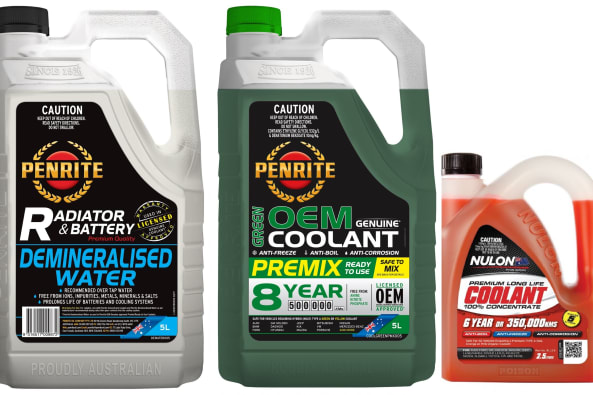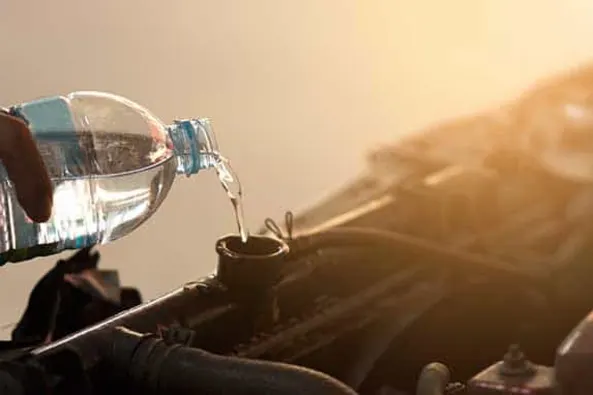
What Coolant Should You Use in Your Car?
Posted in Bigbox Service Tips
Published Sat 18 Feb 2023
What Coolant Should You Use in Your Car?
Coolant. What is it? What does it do? Why are there so many different types? Understanding the purpose of coolant and which type is right for your car is actually crucial for the health of your engine, especially with the warmer weather on its way. If you’re not an expert on this matter or don’t even know the basics, here’s what you need to know.

What is Coolant?
Coolant is the liquid substance that is used in the radiator to keep your engine cool and regulate its temperature. Nowadays, a good performing coolant is becoming more and more essential as engines and cars are becoming smaller and even more powerful, increasing the amount of heat they produce. Radiators are at higher risk of damage in colder climates as water that sits in an idle engine can freeze, forcing the radiator to expand and crack.

Can’t you just use tap water instead?
Whilst using tap water in emergency situations where coolant is not able to be accessed, you should not substitute water for coolant. Using only tap water in your cooling system can cause corrosion damage to your radiator, head gasket and thermostat over time. However, even before that problem arises, you will find that water boils at 100 degrees Celsius and freezes at 0 degrees Celsius. This means that water would not perform in the range of temperatures that your engine requires it to perform at. On hot summer days, your engine can heat up to well over 100 degrees Celsius and when the water starts to boil, pressure will build up from the gas expansion in the system. This will only lead to your heating system overheating and vital gaskets blowing.
What is coolant made of?
Unlike water, coolant is capable of keeping your engine cool and preventing it from overheating when it rises to above 100 degrees under the hood. Coolant can also regulate the temperature of the heating system when the weather drops to below 0 degrees Celsius, without freezing and cracking radiator. Coolant is made with Ethylene Glycol mixed with some protective additives and demineralised water. The substance, glycol, does not absorb heat as well as water does but when added to water it is able to lower the fluid’s freezing point and raise the boiling point.

Why are there different types of coolant and which is your right for my car?
Colour, year, mileage, anti-freeze. These are just a few of the many words that bombard you as you're trying to choose new coolant. Are they important and which is good or bad? To begin with, when you are buying coolant, check your vehicle’s manufacturer’s manual first to find out what coolant they may advise you to use.
There are two main types of coolant, Type A and Type B:
Type A coolant uses an anti-freeze and anti-boil component. This is usually ethylene glycol and is used to reduce the coolant’s freezing point and increase its boiling point. Type B coolant is a coolant inhibitor. It’s similar to Type A and contains around 5-10% of the additives that Type A uses but is used more commonly as a rust or corrosion inhibitor and not as a “coolant”. Type B coolant was more commonly used in vehicles before the 1980’s.
Another confusing factor when choosing a coolant is colour. Red, green, blue, yellow or orange? Which colour does what? What colour do you need?
Green coolant is the conventional coolant (Ethylene Glycol base) and is the most popularly used coolant. Red coolant typically has a base of Organic Acid Technology which is designed to be more suitable for aluminium radiators. Blue coolant is the same as red coolant but what makes it different is that Blue coolant is normally Borate free which is a requirement for modern day Japanese vehicles that are supplied with blue coolant from the factory. Yellow or Orange coolants are the latest in coolant technology and are normally a universal product. It is not recommended to mix coolants, only use water to top up if you don’t have the same coolant available at the time required.
Coolant that is aged can be tested by your Technician who services your vehicle. If you are inspecting your coolant follow the Manufacturer guidelines for testing coolant level in the reservoir. The reservoir level will increase and decrease depending on the temperature of the engine at the time. By overfilling the reservoir, you can cause the system to overflow, it is critical to follow the manufacturer process to ensure you get this right.
Conclusion:
With the warmer spring and summer days ahead, have a think about when was the last time your coolant was changed. If you know it’s been longer than what your manufacturer recommends or if you’ve noticed that the car’s temperature gauge is leaning a little too far on the hot side, have your coolant tested and be confident with the months ahead. Book your vehicle in with Bigbox Service & Tyres. Our team of experienced and trained technicians will take the hassle out of doing it yourself and will keep your engine running cool all throughout the hot months ahead.

Choose.Buy.Enjoy
A better way to buy and sell used cars.





